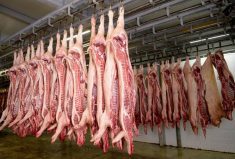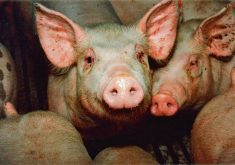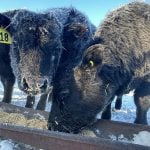Canada is set to ask the World Trade Organization to allow a long list of retaliatory tariffs against U.S. agrifoods and other goods, after a WTO panel shot down Washington’s final defense of its country-of-origin labelling (COOL) law on meat.
The WTO Appellate Body on Monday released its report on the U.S. government’s appeal of its loss last year at a WTO Dispute Settlement Body (DSB) compliance panel — a panel set up after Washington made changes to COOL following a previous loss at the WTO Appellate Body.
Read Also

CBOT Weekly: Additional soybean purchases strengthen U.S. soy
There were good gains for the Chicago soy complex during the week ended Feb. 4, due to positive news that Wednesday.
Monday’s Appellate Body decision “is final, without the possibility of further appeal,” Canada’s Trade Minister Ed Fast and Agriculture Minister Gerry Ritz said in a joint statement.
The U.S., they said, “has used and exhausted all possible means to avoid its international obligations, damaging our highly integrated North American supply chain and hurting producers and processors on both sides of the border.”
Given Monday’s ruling and “the fact that the U.S. has continued to discriminate against Canadian livestock products,” the Canadian government said it will seek authority from the WTO to use “retaliatory measures” on U.S. agricultural and non-agricultural products.
Canada’s shortlist of proposed retaliatory tariffs targets U.S. live cattle and hogs and fresh and frozen beef and pork products.
The shortlist also calls for tariffs on U.S. cereal, bread, pasta, frozen potatoes, frozen orange juice, wine, cheese, cocoa, apples, cherries, fowl, maple syrup, ketchup, sugars, glucose and fructose and some other food- and non-food-related wares.
Fast and Ritz, in a separate joint statement with Mexico’s agriculture secretary Enrique Martinez y Martinez, said both countries will seek retaliation authority from the WTO. Both countries urged Washington to repeal its COOL legislation.
The Appellate Body, in Monday’s report, also calls on the WTO DSB to ask the U.S. to bring its COOL measures “into conformity with its obligations” under world trade agreements.
“The amended COOL measure, which causes Canadian and Mexican livestock and meat to be segregated from those of U.S. origin, is damaging to North America’s supply chain and is harmful to producers and processors in all three countries,” the Canadian and Mexican officials said Monday.
“Historic day”
“Today is an incredibly important and historic day for Canada’s cattle industry,” Dave Solverson, president of the Canadian Cattlemen’s Association, said Monday.
“With a final ruling from the WTO affirming the Canadian beef industry’s right to fair market access firmly in hand, the CCA urges the U.S. Congress to finally repeal COOL on red meat.”
Passed by the U.S. government in 2008 and implemented in 2009, mandatory COOL requires country-of-origin labelling for beef, pork, lamb, chicken and goat meat, and certain perishable commodities sold at retail outlets in the U.S.
The U.S. Department of Agriculture’s revisions to COOL in 2013, in the wake of the Appellate Body’s first ruling, tightened COOL’s labelling provisions for muscle cuts of meat. COOL now requires covered products’ labels to include even more specific information about where each production step — birth, raising, slaughter — took place.
“If there ever was any question that that mandatory country-of-origin labeling is a trade barrier that violates our international agreements, the World Trade Organization’s (WTO) ruling against the U.S. today should lay those doubts to rest,” Barry Carpenter, CEO of the North American Meat Institute, said in a separate release.
The WTO, he said, “has spoken not once, not twice, not three times, but four times in panel and appellate body decisions.”
“This is the WTO’s final judgment and it is comprehensive and compelling,” Canadian Pork Council chairman Rick Bergmann said in a separate release Monday. “There is no wiggle room.”
Reuters on Monday quoted Tim Reif, chief counsel for the U.S. Trade Representative, as saying the Appellate Body ruling was disappointing and Washington will be “considering all options going forward, and will continue to consult with members of Congress and interested members of the public regarding possible next steps.”
Wyoming cattle producer Philip Ellis, president of the U.S. National Cattlemen’s Beef Association, said trade retaliation by Canada and Mexico “will irreparably harm our economy and our relationships with our top trading partners and send a signal to the world that the U.S. doesn’t play by the rules.
“It is long past time that Congress repeal this broken regulation,” he said in a separate release Monday.
“Recordkeeping burdens”
The Appellate Body report on Monday upheld most of the compliance panel’s rulings, finding that the revised U.S. COOL rule “entails the augmentation of the records kept by livestock and meat producers to substantiate the origin claims made on the mandatory retail labels” required on meat muscle cuts under COOL.
The Appellate Body on Monday also shot down the U.S. claim that the compliance panel should have taken the revised COOL labels’ “enhanced accuracy” into account.
Between 57.7 and 66.7 per cent of beef consumed in the U.S., and between 83.5 and 84.1 per cent of pork muscle cuts, “will convey no consumer information on origin despite imposing recordkeeping burdens upstream that detrimentally impact competitive opportunities for foreign livestock,” the Appellate Body said.
Such exemptions under the revised COOL law “support a conclusion that the detrimental impact of that measure on imported livestock does not stem exclusively from legitimate regulatory distinctions,” the Appellate Body added. –– AGCanada.com Network
















